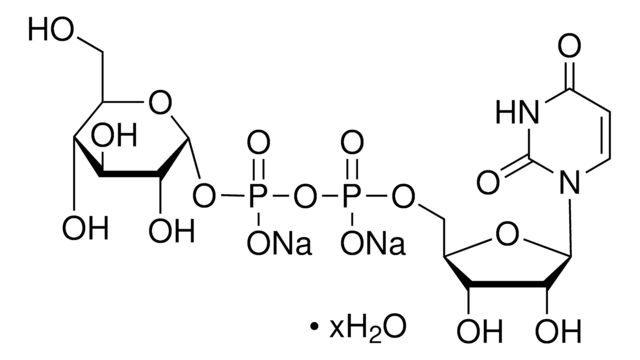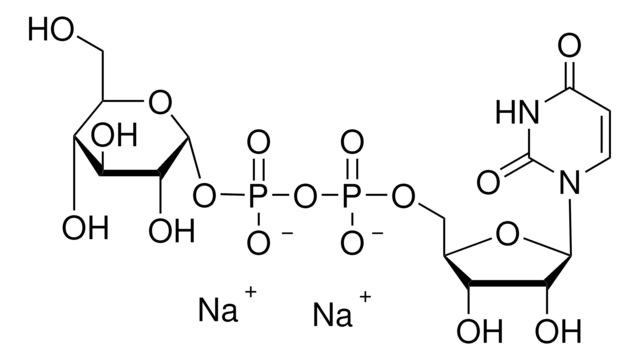U8501
Uridine-5′-diphosphoglucose pyrophosphorylase from baker′s yeast
Type X, lyophilized powder, ≥40 units/mg protein
Synonym(s):
UTP:α-D-glucose-1-phosphate uridylyltransferase
Sign Into View Organizational & Contract Pricing
All Photos(1)
About This Item
Recommended Products
biological source
bakers yeast
Quality Level
type
Type X
form
lyophilized powder
specific activity
≥40 units/mg protein
composition
Protein, 30-60% modified Warburg-Christian
foreign activity
UDP-glucose dehydrogenase and galactose-1-phosphate uridyltransferase ≤0.1%
inorganic pyrophosphatase ≤0.5%
storage temp.
−20°C
Looking for similar products? Visit Product Comparison Guide
General description
Uridine-5′-diphosphoglucose pyrophosphorylase (UDP-glc-PPase) is ubiquitous in plants, yeast, bacteria, and mammals. This enzyme is an octamer of eight identical sub-units.
Application
Uridine-5′-diphosphoglucose pyrophosphorylase from baker′s yeast has been used:
- in the synthesis of uridine-5′-diphosphoglucose (UDP-Glc)-13C9
- to quantify Suc synthase (SUS) enzyme activity in rice
- to study the role of hexokinase and glycogen synthase controls the flux in frog oocytes
Biochem/physiol Actions
Uridine-5′-diphosphoglucose pyrophosphorylase (UDP-glc-PPase) participates in catalyzing the synthesis of UDP-glucose. This enzyme requires divalent cations such as Mg2+, Ca2+, Mn2+, Ni2+ for its activity.
Unit Definition
One unit will form 1.0 μmole of glucose 1-phosphate from uridine-5′-diphosphoglucose and inorganic pyrophosphate per min at pH 7.6 at 25 °C.
Physical form
Lyophilized, sulfate-free powder containing citrate buffer salt
Storage Class Code
11 - Combustible Solids
WGK
WGK 3
Flash Point(F)
Not applicable
Flash Point(C)
Not applicable
Personal Protective Equipment
dust mask type N95 (US), Eyeshields, Gloves
Choose from one of the most recent versions:
Already Own This Product?
Find documentation for the products that you have recently purchased in the Document Library.
Customers Also Viewed
D J Sutor et al.
Clinica chimica acta; international journal of clinical chemistry, 86(3), 329-332 (1978-06-15)
The concentration of pyrophosphate in urine has been determined using the enzyme uridine-5'-diphosphoglucose pyrophosphorylase. The technique is relatively quick and easy to perform. Reproducibility of results was good, and results from recovery experiments were excellent. The mean concentration of pyrophosphate
Himangi R Jayakar et al.
BMC microbiology, 11, 179-179 (2011-08-09)
A number of studies have revealed that Francisella tularensis (FT) suppresses innate immune responses such as chemokine/cytokine production and neutrophil recruitment in the lungs following pulmonary infection via an unidentified mechanism. The ability of FT to evade early innate immune
Leszek A Kleczkowski et al.
The Biochemical journal, 439(3), 375-379 (2011-10-14)
Plant pyrophosphorylases that are capable of producing UDP-sugars, key precursors for glycosylation reactions, include UDP-glucose pyrophosphorylases (A- and B-type), UDP-sugar pyrophosphorylase and UDP-N-acetylglucosamine pyrophosphorylase. Although not sharing significant homology at the amino acid sequence level, the proteins share a common
Yonglan Yu et al.
PloS one, 5(9), e12593-e12593 (2010-09-11)
The trehalose synthetic pathway is present in bacteria, fungi, plants and invertebrate animals, but is absent in vertebrates. This disaccharide mainly functions as a stress protectant against desiccation, heat, cold and oxidation. Genes involved in trehalose synthesis have been observed
Jesús Rodríguez-Díaz et al.
Journal of biotechnology, 154(4), 212-215 (2011-06-15)
UDP-sugars are widely used as substrates in the synthesis of oligosaccharides catalyzed by glycosyltransferases. In the present work a metabolic engineering strategy aimed to direct the carbon flux towards UDP-glucose and UDP-galactose biosynthesis was successfully applied in Lactobacillus casei. The
Our team of scientists has experience in all areas of research including Life Science, Material Science, Chemical Synthesis, Chromatography, Analytical and many others.
Contact Technical Service









